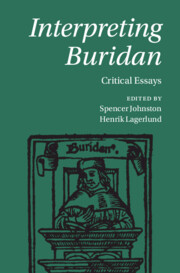Book contents
- Interpreting Buridan
- Interpreting Buridan
- Copyright page
- Dedication
- Contents
- Contributors
- Preface
- Abbreviations
- Introduction
- 1 The Philosopher as Arts Master
- 2 Principles in Buridan’s Logic of Consequences
- 3 Buridan on Paradox
- 4 Modality and Temporality in Buridan’s Logic
- 5 A Paradigm Change within Medieval Philosophy
- 6 Buridan’s Internalism
- 7 John Buridan on the Ontological Status of Artifacts
- 8 John Buridan on Final Causality
- 9 Female Physiology in John Buridan’s Quaestiones de secretis mulierum
- 10 Buridan on the Value of Emotions
- 11 Buridan on Happiness and the Good Life
- References
- Index
8 - John Buridan on Final Causality
Published online by Cambridge University Press: 01 February 2024
- Interpreting Buridan
- Interpreting Buridan
- Copyright page
- Dedication
- Contents
- Contributors
- Preface
- Abbreviations
- Introduction
- 1 The Philosopher as Arts Master
- 2 Principles in Buridan’s Logic of Consequences
- 3 Buridan on Paradox
- 4 Modality and Temporality in Buridan’s Logic
- 5 A Paradigm Change within Medieval Philosophy
- 6 Buridan’s Internalism
- 7 John Buridan on the Ontological Status of Artifacts
- 8 John Buridan on Final Causality
- 9 Female Physiology in John Buridan’s Quaestiones de secretis mulierum
- 10 Buridan on the Value of Emotions
- 11 Buridan on Happiness and the Good Life
- References
- Index
Summary
John Buridan devotes an extensive discussion to final causality in two questions of his commentary on Book ii of the Physics: one asks whether the end is a cause (q. 7) and the other asks whether the necessity in natural operations derives from the end or from matter (q. 13). These two questions are the focus of this essay, which provides a detailed presentation of Buridan’s view, explaining its philosophical significance and setting it in the context of the medieval debate about final causality. It also points out the originality of Buridan’s view. Departing from the dominant medieval interpretation of Aristotle’s concept of the final cause, Buridan does not try to defend the idea that the end to which an action or change is directed is properly speaking a cause of that action, and in doing so he undermines the main assumptions at work in the Aristotelian account of finality in nature.
Keywords
- Type
- Chapter
- Information
- Interpreting BuridanCritical Essays, pp. 135 - 156Publisher: Cambridge University PressPrint publication year: 2024

